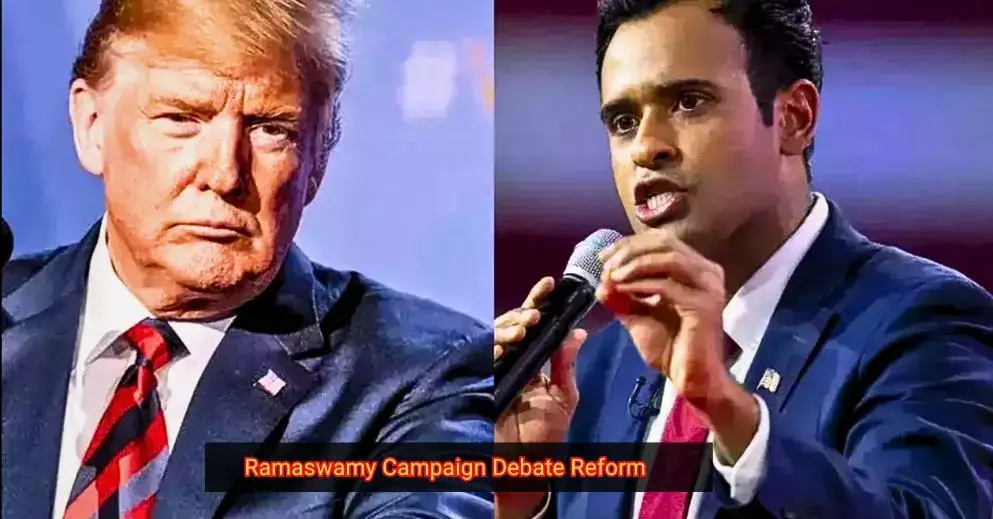Ramaswamy Campaign Debate Reform
In a surprising move, GOP presidential hopeful Vivek Ramaswamy’s campaign has thrown down the gauntlet, urging the Republican National Convention (RNC) to dramatically reduce the number of candidates on the debate stage for the third round.
The campaign’s CEO, Ben Yoho, has penned a compelling letter to the RNC leadership, laying out a bold proposal aimed at streamlining the debate process and focusing on the top contenders.
Revamping the Debate Format
Yoho’s letter directly appeals to RNC Chairwoman Ronna McDaniel and Committee on Arrangements co-chairs David Bossie and Anne Hathaway.
The crux of the campaign’s request is to limit the November debate to the top four candidates, excluding former President Trump.
This strategic move aims to enhance the debate’s quality and impact by providing a clearer spotlight for serious contenders.
Higher Donor Threshold
One of the campaign’s key recommendations is to raise the donor threshold significantly.
Yoho suggests elevating the bar to 100,000 donors, a move intended to ensure that candidates demonstrate substantial grassroots support.
By doing so, the RNC could filter out candidates who may lack the necessary backing to mount a credible challenge to Joe Biden or any Democratic nominee.
Chaos and Clamor in Previous Debates
Yoho doesn’t mince words when addressing the motivation behind these proposals.
He points to the turbulence and confusion that marred the second debate and the conspicuous absence of a clear frontrunner.
The campaign contends that a more focused and disciplined debate format is essential for Republican voters to make informed decisions.
Qualification Criteria
To participate in the November 6 debate, Republican candidates face stringent qualification criteria.
They must either score 4 percent or higher in two national polls or attain 4 percent support in one national poll and two different early state polls.
Additionally, candidates must meet a donor threshold, currently set at a minimum of 70,000 unique donors, including at least 200 from 20 or more states.
Ensuring a Productive Debate
Apart from increasing the donor threshold and reducing the number of candidates, the Ramaswamy campaign emphasizes the need for more structured debate dynamics.
Yoho’s letter calls for additional time for candidates to respond to one another and suggests the appointment of a single moderator with the authority to enforce debate rules, preventing candidates from incessantly talking over each other.
The Urgency of Reform
Yoho emphasizes the urgency of these proposed changes, highlighting the rapidly approaching early-state voting in January.
The campaign argues that another chaotic debate in November would be detrimental to the voters, who deserve a genuine opportunity to choose the party’s nominee.
Voters, they assert, are not well-served when a cacophony of candidates with minimal chances of success drowns out the substantive discourse.
Top Contenders
According to RealClearPolitics’ polling average of GOP presidential candidates, former President Trump continues to dominate the field by an impressive margin of at least 40 percentage points.
The top four candidates, excluding Trump, are Florida Governor Ron DeSantis, former South Carolina Governor Nikki Haley, Vivek Ramaswamy himself, and former Vice President Mike Pence.
A Contested Proposal
The Ramaswamy campaign’s call for reform has not been without controversy. Some within the party view these suggestions as an attempt to stifle diversity of thought
within the GOP. Critics argue that a more inclusive debate stage allows for a broader spectrum of conservative ideas to be heard.
Impact on the Republican Race
The proposed changes could significantly alter the landscape of the Republican primary race.
With fewer candidates on the debate stage, those remaining would have more opportunities to present their policies and engage in substantive discussions.
This could be particularly advantageous for candidates like Ron DeSantis, Nikki Haley, Ramaswamy, and Mike Pence, who are currently the top contenders after Trump.
The RNC’s Deliberation
As the RNC contemplates these proposals, the party faces crucial decisions that could reshape the upcoming debates and, ultimately, the path to selecting the Republican nominee for the 2024 presidential election.
The RNC’s response will likely shape the dynamics of the race, determining which candidates receive a prominent platform to make their case to voters.
Conclusion
Vivek Ramaswamy’s campaign has injected a new level of urgency and debate into the Republican presidential primary.
While the proposed changes may be divisive, they reflect a desire within the party to streamline the nomination process and ensure that voters are presented with the most serious and viable candidates.
As the race unfolds, all eyes will be on the RNC’s decision and the impact it has on the path to selecting the GOP’s nominee for the 2024 election

